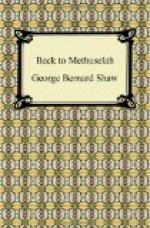experience, coaxed a wistful pathos and a dainty fun
out of the fairy cloudland that lay between him and
the empty heavens. The giants of the theatre of
our time, Ibsen and Strindberg, had no greater comfort
for the world than we: indeed much less; for
they refused us even the Shakespearian-Dickensian consolation
of laughter at mischief, accurately called comic relief.
Our emancipated young successors scorn us, very properly.
But they will be able to do no better whilst the drama
remains pre-Evolutionist. Let them consider the
great exception of Goethe. He, no richer than
Shakespear, Ibsen, or Strindberg in specific talent
as a playwright, is in the empyrean whilst they are
gnashing their teeth in impotent fury in the mud, or
at best finding an acid enjoyment in the irony of
their predicament. Goethe is Olympian: the
other giants are infernal in everything but their veracity
and their repudiation of the irreligion of their time:
that is, they are bitter and hopeless. It is
not a question of mere dates. Goethe was an Evolutionist
in 1830: many playwrights, even young ones, are
still untouched by Creative Evolution in 1920.
Ibsen was Darwinized to the extent of exploiting heredity
on the stage much as the ancient Athenian playwrights
exploited the Eumenides; but there is no trace in his
plays of any faith in or knowledge of Creative Evolution
as a modern scientific fact. True, the poetic
aspiration is plain enough in his Emperor or Galilean;
but it is one of Ibsen’s distinctions that nothing
was valid for him but science; and he left that vision
of the future which his Roman seer calls ‘the
third Empire’ behind him as a Utopian dream
when he settled down to his serious grapple with realities
in those plays of modern life with which he overcame
Europe, and broke the dusty windows of every dry-rotten
theatre in it from Moscow to Manchester.
MY OWN PART IN THE MATTER
In my own activities as a playwright I found this
state of things intolerable. The fashionable
theatre prescribed one serious subject: clandestine
adultery: the dullest of all subjects for a serious
author, whatever it may be for audiences who read
the police intelligence and skip the reviews and leading
articles. I tried slum-landlordism, doctrinaire
Free Love (pseudo-Ibsenism), prostitution, militarism,
marriage, history, current politics, natural Christianity,
national and individual character, paradoxes of conventional
society, husband hunting, questions of conscience,
professional delusions and impostures, all worked
into a series of comedies of manners in the classic
fashion, which was then very much out of fashion,
the mechanical tricks of Parisian ‘construction’
being de rigueur in the theatre. But this,
though it occupied me and established me professionally,
did not constitute me an iconographer of the religion
of my time, and thus fulfil my natural function as
an artist. I was quite conscious of this; for




